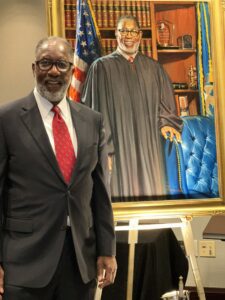
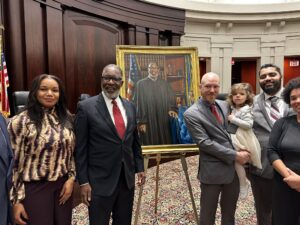
Wilder with members of his family
It is always exciting to present a portrait. Last week was the investiture of Hon. Kurtis Wilder’s portrait at the Michigan Supreme Court. The ceremony took place in front of the entire court, all members present. There were speeches by many supporters, including former governors Engler and Snider.
Here’s a transcript of my speech
Honorable justices of the court, and distinguished guests. I’m joined today by my wife Cate and my sister Betsy. We’re all here to celebrate the life and achievements of Kurt Wilder. But you know, it’s a tremendous honor for me, and a solemn and humbling occasion, when my work as an artist is successful, that is to say, when it connects us, intimately, to the subject.
How do you capture the charisma and charm of a man like Kurt Wilder with a colorful stroke of paint in the brow? How do you get the eyes that have seen so deeply into the human condition, as Kurt Wilder’s have, to follow you around the room? How do you tell all the success stories, the stinging setbacks, each turned on their heals by more stunning achievements, that have distinguished Kurt Wilders’s distinctly non-linear career, in the simple gesture of a pose? How does an artist, armed only with animal hair glued to sticks and some colored mud, acknowledge the profound artistry that is justice itself?
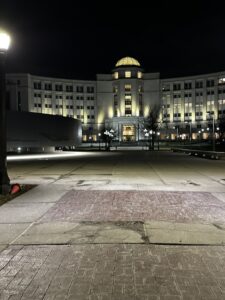
The Hall of Justice
In my 44 years as a professional portrait artist, I have had the privilege of observing and translating the unique stories etched into the faces of many distinguished individuals. Justice Wilder’s countenance, is a canvas marked not just by time but by the profound impact he has had on the tapestry of justice in this great state.
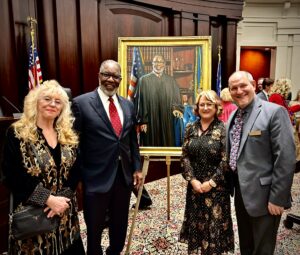
Wilder with Cate and my sister Betsy
Richard Avedon the famous photographer famously said that “All photographs are accurate, but none of them are true.” You c it an call me naïve, and a wee bit impartial, but I believe that truth can only be captured in the painted portrait. When I encounter my subjects I try to get a sense of how they move through space, their rhythm and energy, to learn what drives them. In short, I become them, so I can paint myself. I guess that means I have about ten self portraits here in the Michigan Supreme Court. I believe this is number ten. I am proud of that accomplishment, and humbled that I am trusted each time to somehow coax the intricate stories and complexities of such great men and woman out of the colors of my palette. I hope my portrait tells the story of your legacy Kurt, I really do, in a way that the volumes listing all your many accomplishments, never will be able. In time, your portrait will be more you than you.
A six year old girl once told me, “your artwork is more real than real,” which I consider that the greatest compliment I ever received. I believe a portrait must be a deep dive into the psyche of the subject. A portrait is how a person is the way they are. For years my stated goal had been to create figures and subjects so real they could step out of the canvas. Now, I see myself creating a world that invites the viewer to inhabit. I’m only ever asking myself one question when I paint: how can I make this individual appear at the very least, as kind and lovable as I found them?
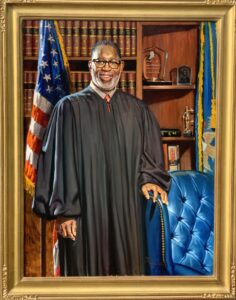 I believe it is the artists who are the conscience of society, lighting the way for politicians and public servants. So since I have so many of you all together in one room, let me implore you to pay attention to what we artists are doing and saying. We live among you to speak light into the world. But you must be willing to see it. I think we are in a room of people who get it. Even George Bush has hopped onto the art band wagon. I don’t know how many of you know since his retirement from public service he’s devoted himself to painting portraits. I think with a little more practice he could really make a name for himself.
I believe it is the artists who are the conscience of society, lighting the way for politicians and public servants. So since I have so many of you all together in one room, let me implore you to pay attention to what we artists are doing and saying. We live among you to speak light into the world. But you must be willing to see it. I think we are in a room of people who get it. Even George Bush has hopped onto the art band wagon. I don’t know how many of you know since his retirement from public service he’s devoted himself to painting portraits. I think with a little more practice he could really make a name for himself.
But I digress. A little. John Singer Sargent famously didn’t like to get to know his subjects TOO well, preferring to trust his first impression. My first impression of Kurt was of a warm, affable and kind man, a man who doesn’t wait around for something to happen. He makes things happen. Kurt is equally as interested in the stories and aspirations of janitors as he is of governors. I just hope my portrait has captured a glimmer of his charisma, humility and deep interest and genuine investment he has made in the successes of others. I’m personally grateful for his passionate support of the Interlochen center for the Arts. I was a camp counselor there and a happy camper years before, back in an ancient time we called the seventies. A true arts advocate, I admire Kurt’s laser focus on building others up. That’s why I could not be more proud to present my portrait of the Honorable Justice Kurtis Wilder, may it please the court.

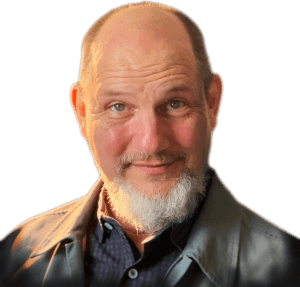 Would you like to get inspiration in your inbox, rather than ads for more stuff? Welcome to ManiscalcoGallery.com
Would you like to get inspiration in your inbox, rather than ads for more stuff? Welcome to ManiscalcoGallery.com